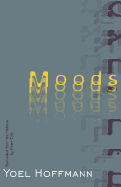
In part 148 of Moods, Israeli author Yoel Hoffmann's (Curriculum Vitae) novel-cum-memoir, he describes automatic writing, wherein writers channel prose as if it came in an uninterrupted flow, divinely inspired. He quips, "Most likely at that very moment God felt a terrible sense of constriction." It's these asides, tacked onto paragraphs like a wry whisper from a neighbor at the dinner table, that give Moods its unconventional allure. Hoffmann's meditations span the universal to the particular, and amidst these terse, numbered sections, the reader is invited to marvel and laugh at the quotidian.
The intersection of ordinariness and awe recurs often here, a polarity that colors encounters such as the young narrator's rendezvous with a French prostitute. People die, crows perch and Hoffmann sees God--or his absence--in these daily goings-on. His lyrical, elliptical nods to depression are some of the book's most moving passages, as when he writes, "We too have trouble when it comes to finishing the month... feelings are always troubling our heart. The feeling of things past. Of sights. And things we've lost. Of night. We send up a prayer that we won't be so needy."
The book's one glaring flaw is its treatment of women. The author's invocation of a female psychoanalyst's "breasts hidden within her suit jacket like two stowaways" provides one example in which word choice seems poor, but these puzzling passages are fleeting. Stylistically innovative and emotionally powerful, Moods manages the rare feat of pinning ephemera onto paper. --Linnie Greene, freelance writer

